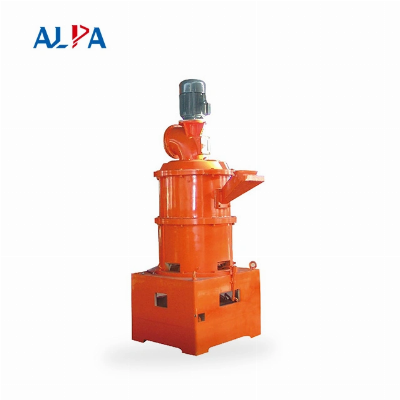Ultrafine 2.5um Output 5t/H Ceramic Three Roll Roller Grinding
MillFEATURES AND ADVANTAGES* Available D50:1.5~45μm* Relying on the
grinding roller orbital revolution and rotation on the grinding
ring track to finish grinding.* Compared with Raymond mill or ball
mill, the production efficiency is more than doubled under the same
dynamic conditions,lower operating cost.* Large output: grinding
calcium carbonate, the fineness is 10μm, the output can reach 3
tons / hour or more* Good product fineness index: can reach the
fineness of fluidized bed jet mill, D97: 3 ~ 45μm* Built-in
classifying wheel* It is equipped with classifying wheel frequency
control, which can adjust the granularity of the product without
stopping the machine.* Unique structure of classifying impeller,
favorable classifying effect and no particle pollution.* Favorable
product granularity and stability,Ideal equipment for current dry
grinding method to produce non-metallic mineral fine powder such as
calcium carbonate.* The complete set of equipment is easy to
install and does not require large civil works.* Fine powder can be
completely recycled without polluting the environment.* Compact
structure and small occupation.easy to disassemble and clean* Lower
installation power, wide application, high cost-performance.*
Grinding is in closed system, low dust and noise, clean and
environmentally friendly production process.* PLC control system,
easy operation.* Particle sizes can be adjusted as needed.Could
produce powder of D97: 3-8μm, and also produce ordinary powder of
D97: 10-40μm.* Can be used in series with multi-stage classifiers
to produce products with multiple sizes at one time.*
Explosion-proof design can be selected to meet the requirements of
ultra-fine grinding processing of flammable and explosive oxide
materials.WORKING PRINCIPLERoller mills(micro powder roller
mill,fine roller mill,ring roller mill,roller grinding
machine,automatic roller mill,three/fourroller/rolling mill) are
mills that use cylindrical rollers, either in opposing pairs or
against flat plates, to crush or grindvarious materials, such as
grain, ore, gravel, plastic, and others. Roller grain mills are an
alternative to traditional millstonearrangements in gristmills.
Roller mills for rock complement other types of mills, such as ball
mills and hammermills, in such industries as the mining and
processing of ore and construction aggregate; cement milling; and
recycling.Transmission device connects with main shaft. The top of
shaft connects with rotor structure. The rotor structure has
peripheral shaft. Peripheral shaft is installed with roller. When
the main shaft starts to rotate, peripheral shaft rotates too,
which would make the rollers revolve around main shaft and also
rotate round peripheral shaft. The roller would create strong
centrifugal force during the rotation and revolving, and grind
material with stator. The ground material would fall down to the
distribution plate. The distribution plate and the main shaft would
rotate at the same time, and bring material to the round ring.
Under negative pressure, it would go along the distribution ring to
the classifier chamber. Qualified fine powder would go through the
classifier wheel and into the collector, while coarse powder would
fall down back to the milling chamber for further grinding.ALPA is
a rolling mill manufacturer that produces various types of
mills.TECHNICAL
PARAMETERS ParameterRLM89RLM189RLM219SizeD97Output(kg/h)kwh/tonOutput(kg/h)kwh/tonOutput(kg/h)kwh/ton60028um 4500~500030 80018um2500~2800433500~4200423500~420040125010um1500~1800672000~2500752000~25007215009um1000~1300921500~2000951600~21009215007.8um650~7501251000~15001131100~160011025005.5um600~650135800~1200123900~1300119POWER152kw237kw237kwThe
above data is based on heavy calcium (feed size
Related products about Ultrafine 2.5um Output 5t/H Ceramic Three Roll Roller Grinding Mill
-
 Waste Tyre Plastic Recycling Machinery Machine Tire Crusher Production Line Rubber Crumb Grinding Machine Equipment Tire Shredder
Waste Tyre Plastic Recycling Machinery Machine Tire Crusher Production Line Rubber Crumb Grinding Machine Equipment Tire Shredder
-
 Stretch Plastic Blowing Pet Bottle Making Blow Molding Machine Bottles Stretch Automatic Pet Bottle Blowing Machine
Stretch Plastic Blowing Pet Bottle Making Blow Molding Machine Bottles Stretch Automatic Pet Bottle Blowing Machine
-
 Waste Plastic Pet Bottle, Water Bottle Flake, PP/HDPE/LDPE PE Film Jumbo Woven Bags Plastic Crusher Machine, Plastic Crushing Washing Recycling Machine
Waste Plastic Pet Bottle, Water Bottle Flake, PP/HDPE/LDPE PE Film Jumbo Woven Bags Plastic Crusher Machine, Plastic Crushing Washing Recycling Machine
-
 Type 2 Wall-Mounted Electric Car Charging Station 7kw /11 Kwelectric Vehicle Charging Station Home Wallbox AC EV Charger Single Phase or 3three Phase
Type 2 Wall-Mounted Electric Car Charging Station 7kw /11 Kwelectric Vehicle Charging Station Home Wallbox AC EV Charger Single Phase or 3three Phase
-
 G-View G12W Wholesale Auto Car LED Headlight Bulb High Power H13 H11 9005 H7 H4 Car LED Headlights LED Car Lights
G-View G12W Wholesale Auto Car LED Headlight Bulb High Power H13 H11 9005 H7 H4 Car LED Headlights LED Car Lights
-
 New Design Porcelain Round Plates Dinner Set for Wedding and Banquet
New Design Porcelain Round Plates Dinner Set for Wedding and Banquet
-
 China 2023 New Design Super Soft 100% Polyester Microfiber Knitted Oversized Decoration Hoodie Blanket
China 2023 New Design Super Soft 100% Polyester Microfiber Knitted Oversized Decoration Hoodie Blanket
-
 Handmade Art Creative Materials Thickened White Paper Cup DIY Disposable Handmade Colored Paper Cup
Handmade Art Creative Materials Thickened White Paper Cup DIY Disposable Handmade Colored Paper Cup



